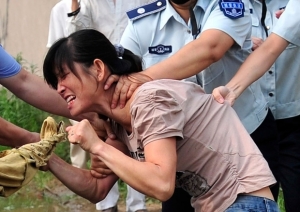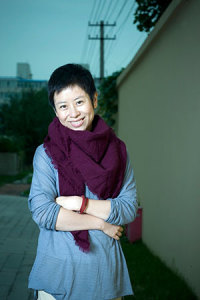IAN JOHNSON02.03.15
 (AFP/Getty Images)
(AFP/Getty Images)
A protester is restrained by law enforcement officers as a group of buildings is demolished in Wuhan, Hubei province, in this archival image from 2011.
Liu Yu is one of China’s best-known America-watchers. A professor of political science at Tsinghua University, she lived in the U.S. from 2000 to 2007 and now researches democratization in developing countries, including her own. The thirty-eight-year-old became famous in China in 2009 with the publication (in Chinese) of Details of Democracy, a collection of her blogs that described how politics works in America. The book earned her the moniker among online fans as “China’s de Toqueville” (she’s quick to reject that as too flattering). She is a popular public speaker, although she has received fewer invitations to speak in recent months, which she attributes to growing pressure in China to silence critical voices. I spoke to her recently in Beijing.
Ian Johnson: What inspired you to start blogging about American politics?
Liu Yu
Liu Yu: A lot of people in China are very cynical about “capitalist democracy.” When there was campaign finance reform on soft money in the U.S., I had to explain that capitalists such as Bill Gates can’t just wire as much money as they want to a politician and then demand that the politician pass bills supporting their companies. My basic approach was to introduce democracy to my readers—how bills are passed, how society is organized—through stories and issues rather than through abstract jargon. For example, there was a big subway workers’ strike in New York City. I wrote how it happened, how different parties negotiated and compromised, how all parties including the authorities had to act within the law and the strike could not be just “put down” [as it would be in China] by policemen in the name of “maintaining stability.”
So you set out to explain American democracy.
No. My book is about American democracy, but it’s really about democracy in general. I happened to be in America when I was writing it.
It’s interesting because when you were there, the U.S. was involved in the “war on terror,” civil liberties were being curtailed, terrorism suspects were being tortured. But you found good things to write about.
I think you Americans, your political agenda has become taken over by these differences between the Republicans and the Democrats. Every day, you fight about issues like taxation or abortion. But perhaps you have forgotten that the things the Republicans and Democrats share are much larger than what separates them. You already take certain principles for granted, like freedom of speech, like independence of judiciary. Because more than two hundred ago you settled some of these fundamental issues, such as checks and balances, human rights, small government. You’ve already had these things for so long, you take them as a given. But it’s not a given in China.
It seems like Chinese readers were receptive to this optimism about the U.S. When you published your book, Details of Democracy, in 2009 it became a best seller, selling over 400,000 legal copies.
It had to do with a change in political culture. Starting in the middle of the 1990s, with the publication of China Can Say No, most Chinese books about the United States were negative. A lot of Chinese say Americans like to demonize China when in fact there is much greater Chinese demonization of the United States. But beginning in about 2008, opinion was shifting away from nationalism to a more liberal outlook—in the classic sense of liberalism, of valuing freedom and equality. Or at least it was among a group of people. I don’t mean all intellectual classes, but there was a significant group. So I think my book’s popularity was because people were ready to hear something other than the usual negative propaganda about America.
How did this openness come about?
I think it was related to the Internet. Of course you can’t say that before the Internet there were no liberal people in China. But they had no platform. There was no place they could speak out. It was hard for them to meet. The Internet provided this. Also, until about 2010, the government wasn’t fully aware of how “dangerous” the Internet is. The authorities weren’t as skilled as today in limiting it. So relatively speaking liberal voices were on the rise.
That trend seems to contrast with what many people see in China today. What happened?
Liberals have been in many ways stifled by effective government censorship. Because of this increasingly powerful and omnipresent machine, they can now only find limited space to spread and grow. But I don’t think the “Internet Spring” is a failure. There is a difference between liberal voices not existing at all and liberal voices having little space to express themselves. These voices in China are just laying dormant now. But you cannot send a baby already born back to its mother’s womb. The “Internet Spring” allowed a significant group of people to connect with each other, and the effect of those connections has yet to be seen. Voices can be temporarily put down, but people are what matter in the long run.
When I interviewed Ran Yunfei, he argued that intellectuals in China are irresponsible and don’t yet know how to conduct political debates.
I sort of agree with Ran. I think it’s partly because the government has a monopoly on traditional forms of media. So public debate has only taken place online. But online debates have different characteristics than, say, newspapers or magazines. One is that you can publish much more easily anonymously. You can be very irresponsible because of the anonymity. Also, online comments can attract a lot of people very quickly. And it can be hard to back down because of this “crowd effect.” Also, things happen so fast. Someone curses you and you might suddenly curse them. Normally you don’t curse but suddenly you are.
For detail please visit here

